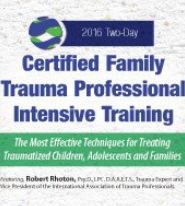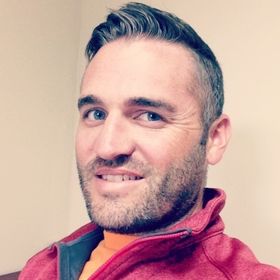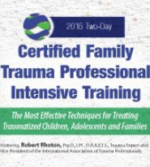(This course is available for immediate delivery)
Robert Rhoton – Certified Family Trauma Professional Intensive Training
This intensive training you’ll get tools and strategies to better treat and heal trauma that exists within the family. Learn how to improve the lives of children, adolescents and their caregivers by increasing quality of stability and connection that is shared between family members — before it’s too late.
Dr. Robert Rhoton will show you how the treatment of children and adolescents is enhanced by approaching treatment from a family based perspective. He will teach a process for stabilizing families to improve outcomes of trauma focused treatment. You will be able to help reduce the shame, guilt and judgement that are a result of the trauma and stress that are active within families.
Leave this training with greater confidence in treating trauma in children and adolescents, as well as, reduce the impact of that trauma on their family or caregivers.
Learn how to capture the resources of a family to improve care and create greater safety and stability for the family. This approach has the ability to not only improve the life of a child, but change the dynamic of an entire family for the better. Come and learn how to deeply impact children and adolescents through family engagement and treatment for trauma.
In addition, completion of this two-day training meets the educational requirements when applying to become a Certified Family Trauma Professional (International Association of Trauma Professionals www.traumapro.net).
Utilize the physiology of the body as a means to explain dysfunction and traumatic family patterns to improve clinical outcomes.
Utilize clinical strategies to incorporate treatment that reduces the impact of Traumagenesis in families.
Explain the clinical implications of the theory that from a family prospective, trauma is more about Traumagenesis than focused on specific events.
Identify the parts of the brain and nervous system that create trauma and change family dynamics and relate this to case conceptualization.
Utilize clinical strategies to reduce the feelings of shame, guilt and judgement in clients.
Correlate the findings of the Adverse Childhood Experiences Study (ACEs) to the lifelong impact on people and families for the purpose of client psychoeducation.
Explain the process by which trauma is created and maintained in families and it’s clinical implications.
Explain how the process of adaption and change creates problematic behaviors and dysfunctional family dynamics, and how the process of adaptation informs the clinician’s choice of treatment interventions.
List the stages of safety building as related to clinical treatment.
Put into clinical practice the International Association of Trauma Professionals trauma treatment structure.
Assess family dynamics from a Traumageneic prospective and how these dynamics inform clinical treatment options.
Apply the primary models of family-based treatment for trauma in a clinical setting.
Day 1
Trauma: The Creator of Adaptive and Maladaptive Behavior Traumagenesis
Neurobiology/physiology and the creation of adaptive responses
Adaptive responses and reason, planning or intentionality
Environmental activators of the threat response system
How Trauma is Created and Maintained in Families
Adaptive and maladaptive behaviors
Patterns become family culture
Family culture becomes a transfer agent between generations
The Impact of Trauma on Family Culture
Patterns and genetics
How beliefs and personally relevant truths are established
Family homeostasis based on trauma and the resultant behaviors
Assessing Family Trauma
Traumagenic assessment process
The 7 domains of assessment for families
Family Strengths and Needs and Trauma Assessment FANS-T
Stabilizing Families for Treatment
Reactive adaptation to help families feel safe in therapy
Normalize the reactions that operate in the family
Build hope through compassion and respect
Engage families in the process of treatment
Would you like to receive Robert Rhoton – Certified Family Trauma Professional Intensive Training ?
Day 2
Treatment from a Family-Based Prospective
Benefits of treating families over children for trauma
Neurobiological sound approach to treatment
Essentials for Family-Based Trauma Treatment
Manage self and keep out of the threat response system
Calm parties by educating them on the treatment process
Focus on function over behaviors
Deal with shame, guilt and judgment
IATP Treatment Structure for Families
Active ingredients applied to family treatment
Relationship building: Safety and predictability in treatment
Psychoeducation
Self-regulation skill building
Growth and resilience in families
Models of Treatment for Families
Figley’s family trauma treatment
ARC – Attachment, Regulation and Competency
CPP – Child and Parent Psychotherapy
Brier and Langtree’s Self-trauma treatment structure
Relationship enhancement play therapies
Resolution of Trauma within Families
Put families on the pathway to growth and resilience
Activities to help families prepare for intervention
Examine family culture for activators
Create a shared language around common elements
Here’s What You’ll Get in Robert Rhoton – Certified Family Trauma Professional Intensive Training








